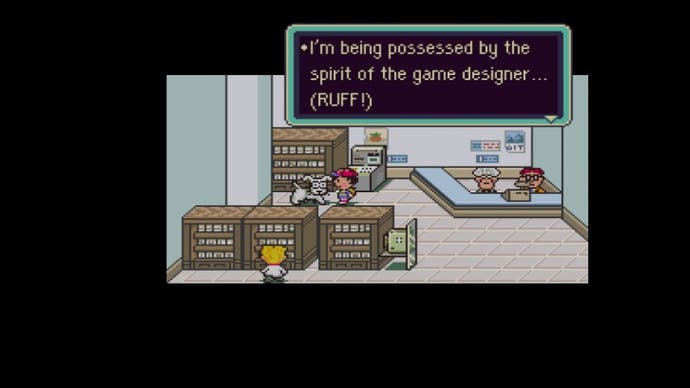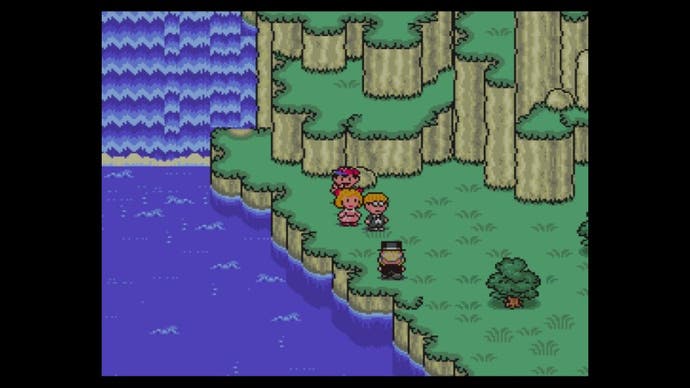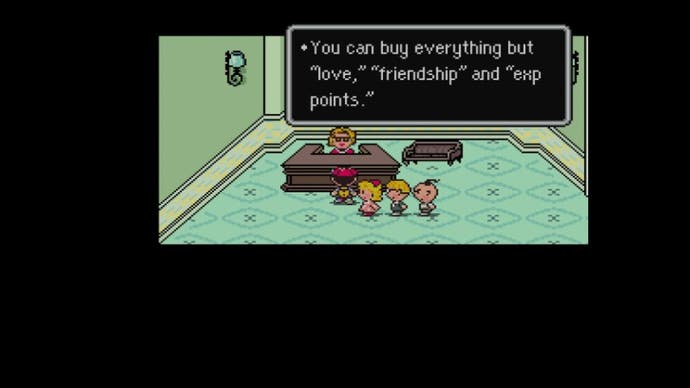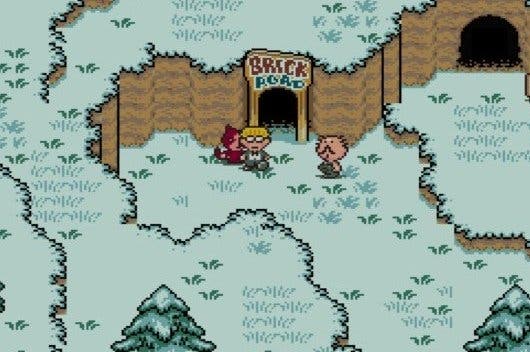Rich Stanton on: Playing human in Earthbound
Why some virtual worlds feel real.
The news of Satoru Iwata's death filled me with sadness, and a desire to return to Earthbound - the game that, without his skills, would not exist as it does. I first played it when I was a teenager, have gone back a few times over the years, and on every occasion find something new to think about. This time it was why, of all the virtual worlds I have inhabited, this cartoony 16-bit one feels the most human.
'Human' risks being a meaningless term so let's define it in relation to a video game: a world and inhabitants that have emotionally engaging qualities. Ness is program code and a handful of sprites stitched together, but in my head I feel I know him, even like I'm friends with him. What kind of design leads to that and, for example, what kind of design leads to your average AAA Nathan Drake? The latter and his ilk go instantly into my mental box marked 'video game character' - I never for a second consider them anything more than a 3D model.
Earthbound's driving creative force, Shigesato Itoi, is primarily a writer. The specifics of his style we'll come to later, but what this means in a mechanical sense is playfulness with the form of video games. Earthbound is often described as a traditional JRPG, which is correct, but leaves out the enormous amount of bespoke touches to things like the UI, structure and how genre cliches are repurposed.
Sometimes the effect is merely tonal, but more often Earthbound uses convention to construct new ways of reaching the player. A simple example: when characters level up, the increase in stats is listed simply in the format 'IQ went up by 2'. On the rarer occasions a stat really jumps, it breaks out of accountant mode: "Oh baby, Offense went up by 7!"

That's a splash of personality on a stat screen. A more comprehensive UI technique is used when a party member is KO'd - you have to revive them and, until that point, their ghost will follow you around as the menus and text windows take on an unpleasant reddish hue. This may sound like a crass effect but it succeeds in tinging your mindset, inasmuch as having a wounded friend for any length of time feels horrible. One of Earthbound's core themes is the importance of friendship, so the effect is not accidental.
Alone, such techniques are insignificant. Earthbound goes for big combinations. It was one of the earliest games to have an idea of a 'living' world, in terms of day-to-day change, which has one ingenious expression in the newspaper you wake up to each day. Not only do the headlines reflect what you've been up to recently, and there are a lot, but the paper is presented as a part of the town's ecosystem. When zombies take over Threed, the hotel staff tell you the usual paper's been replaced with the Zombie Herald, which has headlines like "Boogey tent falls! Young human to blame."
This principle is applied across the game to NPCs, and it's especially enjoyable with the wicked ones. While the zombies have Threed a guy is running around saying "I've got to save my own skin!" When you've saved the day you can find him again. "The town is at peace but my wife and kids won't speak to me. What's the problem?"
Earthbound puts incredible effort into setting up gags like this and, in some cases, to humanising the most unexpected elements. In the origin story for Jeff, a party member, you guide him through a small dungeon containing signs that outline the principles of good dungeon construction. The ordeal ends with a sign next to the exit saying "way to go." But this joke has barely begun. After exiting you meet Brickroad, a chap with a permanently surprised expression and an amazing moustache, who calls himself the 'dungeon developer.'
"I've devoted my life to making dungeons. Well, by combining my skills and Dr Andonuts' intelligence, I can become Dungeon Man, the first combination of human and dungeon in history. Let's meet again once I have become dungeon man."
He offers you a bed for the night, then tells you to take care and come back again. Much, much later you meet him again after accidentally exploring some of his anatomy and, yes, he has become a gigantic walking dungeon. Then the table flips. Dungeon man joins your party as a super-strong ally and simply batters enemies for you, before eventually getting stuck between two palm trees.

It is worth emphasising the outcome of this strategy with language, because it matters a great deal for a game of Earthbound's type. When nearly every character says interesting things, and some get you involved in crazy stuff, you want to talk to every NPC.
NPCs are one thing, however, and the emotional connection that Earthbound manages to create with its players goes beyond that. The single most important factor in Ness's character is his relationship with his parents, and there are two important parts to it. The first is that Itoi used RPG convention in an incredible way by building the save system around Ness's absent father, who is a voice on the telephone. Ness's dad is fun to talk to anyway, but this means the player makes a habit of it. So too is there a structural element to Ness's relationship with his mother: if you don't phone her in a long time, he'll get homesick and start underperforming in battle.
The second part of the family relationship is how Itoi writes dialogue. His style is best explained through a brief digression on first principles. Words are an approximation of reality. Language is at its most precise when describing physical objects, but when you try to pin down abstract, fluid things like emotion there's more of a problem.
Most of the world deals with this by resorting to cliché - think of your local card shop. And an unfortunate consequence of emotions being difficult to articulate in general is that, when it comes to those you most care about, transcribing such feelings verges on the impossible. Trying to explain your feelings towards your parents, presuming a happy childhood, would see even the best of us struck dumb. The bond is so profound that much is beyond language's capabilities.
Which is why, for most of us, it remains unspoken. A key quality of Itoi's style is his understanding of how people with close relationships speak to each other, and that deep feelings are expressed through mundane sentences rather than beautiful couplets.
When Ness phones his mum she's anxious whether he's eating well, tries to boost his confidence, and sometimes has to dash because the soap she was watching has got to a really steamy part. When Jeff meets his dad for the first time in ten years, the latter's opening gambit is: "Uh, those glasses look good on you. How about a donut?" Which is obviously funny, but also rings true.
After a few hours of play you may, while out doing whatever, receive a phone call: "Hello, it's your dad here. You've been out there for a long time now, It may be none of my business but don't you think it would be a good idea if you took a break?" Few games ever suggest such a thing but, in the world of |Earthbound, someone's keeping an eye on you. The player's potential refusal allows for a little meta humour - say no and dad replies "well it doesn't make me happy. But I understand your point about the fate of the world being at stake."
The truly meta aspect of Ness's character is that for many gamers, and certainly me, the gatekeepers to gaming were our parents. They gave us the wonderful games, and circumscribed our time with them. I first played Earthbound when a young teenager, and themes like this didn't register. But playing as an adult I find the regular checking-in with Ness's parents echoes some part of boyhood, an ungraspable and impossible sense that mum might call me for dinner, or dad's head pop round the door.

Such identification is possible because Earthbound's main character, Ness, is in some sense a cipher - a mute vessel waiting for a player. But his family are not. The theme even extends to inventory: when you want Escargo Express to store items, their agent on the phone is your sister Tracy. The deliverymen turn up swiftly thereafter, so fast it almost feels like a family member's pulled some strings. Ludicrous an interpretation as this is, what matters is that a piece of busywork has a human connection.
Earthbound begins and ends with Ness going to bed in his mother's house. Parents are the one fixed point in a child's fantasy life, and so too in Earthbound. The Japanese title for the series is of course Mother, with Earthbound being Mother 2. Though the word is one of the most well-known and understood in the world, Itoi's specific inspiration was the John Lennon song 'Mother.' Lennon was raised as a boy by his aunt, his father was absent, and his mother died tragically when he was 17. The song's grief builds through opposition ("I needed you, but you didn't need me") before the raw anguish of its close, where Lennon repeatedly screams "Momma don't go, daddy come home." It's a beautiful record, but uncomfortable listening.
This tension seems to be what attracted Itoi who, while enjoying a much more stable childhood than Lennon, also had an absent father. Such a relationship is replicated in Earthbound: Ness never sees his dad (even in the credits he's a telephone) but can go home to mum at any time.
It is a simple and painful point: no matter a parent's good intentions, if they're not there for their child then... where were they? The innocence we adore in Earthbound's world is the context for even darker outcrops than neglect: terrorist groups, a spirit that breaks your limbs one-by-one, corrupt police, or the primeval malevolence of Gygas. The inspiration for the latter's appearance, a repeating Rorschach of red-black hue, is a film scene Itoi saw when young that heavily implies rape. A loss-of-innocence moment.
This is why Earthbound feels human. It is about innocence and childhood, but also growing up and what this does to your view of the world. We all had those moments where some part of our brain was permanently altered, and I remember every one of mine sharply. Earthbound is a great coming-of-age tale because it is bittersweet.
For all these complexities of construction and theme, Earthbound has a simple message at its heart. Ness's journey is enabled and framed by the unspoken love that runs through our daily lives, and makes them worth living. Earthbound tells us to appreciate family and friends while we can, and to think about giving your folks a ring. After all...
"We're a great team, aren't we?"

